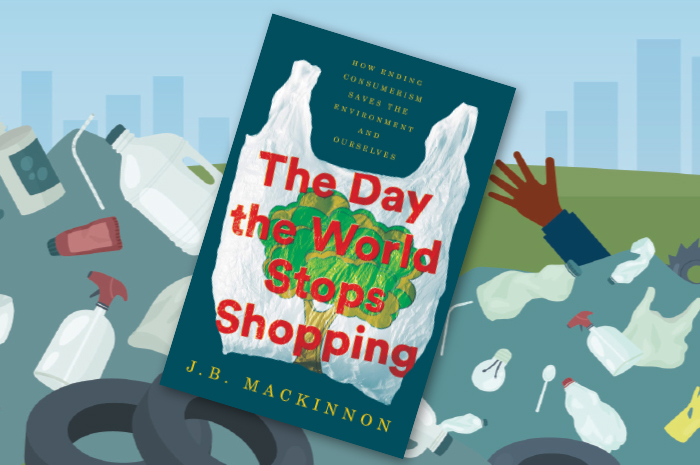
No Sale!
A Canadian journalist imagines a more sustainable future in curbing excessive consumption.
Review by Robin Tatu
The Day the World Stops Shopping: How Ending Consumerism Saves the Environment and Ourselves
By J.B. MacKinnon
HarperCollins, 2021.
314 pages.
“Live simply so others may simply live” urges a popular saying attributed to Mahatma Gandhi. Just how few people manage to live up to that aspiration becomes apparent in this thoughtful, deeply sourced book by Canadian journalist J.B. MacKinnon. Across the globe, consumers are buying more and more stuff each year. In so doing, they are contributing to environmental destruction and imperiling humanity’s continued existence. The amount of clothing alone purchased each year tips the scales at a whopping 50 million tons, while the yearly output of garbage in the United States and Canada could circle the globe 12 times. Americans are often accused of excess, yet their consumption now is outstripped by residents of oil-rich Middle Eastern countries, while European Union nations and Canada are closing in on US levels. Even citizens in the world’s poorest countries buy “what they are willing to pay for—not what they ‘need,’” spending more than $5 trillion annually.
MacKinnon outlines the toll that materialism and excessive consumerism take on the environment: Earth’s assets are being depleted 1.7 times faster than they can be regenerated, as evidenced by landfills overflowing with packaging, land stripped of “every major natural resource, from oil to gemstones,” and cargo ships burning fossil fuels to convey products across the high seas. Yet, even as climate researchers float ambitious geo-engineering projects to ensure our future, slowing consumption is seldom given serious consideration. The Day the World Stops Shopping explores the reasons behind this while imagining a world that transcends consumerism. Its four sections—First Days, Collapse, Adaptation, and Transformation—examine short- and long-term advantages as well as potential losses for economies, the environment, societies, and individuals in this envisioned future.
Having experienced the supply-chain disruptions caused by the pandemic, people today may have a better perspective on the potential benefits of a global downshift in shopping. The transition would require massive adjustments in our daily lives, and economies could suffer if businesses faltered as a result, Still, MacKinnon argues, curtailing consumption could yield significant improvements in both environmental and human well-being. Examples of successful alternative models abound in these pages, from “deep economy” businesses that put community before profits to clothiers that use “demarketing strategies” to urge customers to buy less. Individual “simplifiers” and groups like the International Centre for Anti-Consumption Research demonstrate how people can shift to low- or no-purchase lifestyles and embrace reuse, repair, and making do with less. The author’s visit to Namibia’s Ju/’hoansi people in the Kalahari Desert provides a fascinating glimpse at the satisfactions of a hunter-gatherer lifestyle that emphasizes collaboration and sharing amid material scarcity.
Also thought-provoking are MacKinnon’s discussions of why we buy so much stuff, often against our own best interests, and whether it is possible to curb our shopping addictions. In detailing the fierce attractions of consumerism, the author lays bare “the forces stacked in its favor—from social inertia, to pressure to conform, to governments that rise or fall on a percentage point of economic growth, to the vast machineries of advertising and multi-trillion-dollar markets with investors to serve.” Individuals can make their own shifts, but collective action is required for meaningful, widespread impact. That includes government policies to promote product durability and reuse; a “well-being economy” measured by the quality of citizens’ lives, not GDP; and work cultures that promote sustainability rather than stoking our desire to acquire and keep up with the Joneses.
“Solving the consumer dilemma is the most urgent challenge of our time,” MacKinnon declares, “the problem that begets all our other biggest problems.” Although solutions will not come easily, he remains confident that our 21st-century propensity for adjusting to technological, economic, and ecological disruption will serve us well. Consumerism is not an inevitable choice, and with its increasingly damaging costs, it is a lifestyle that we can resist.
Robin Tatu is Prism‘s book editor.
© Amazon/Getty Images/Alexander Da Silva